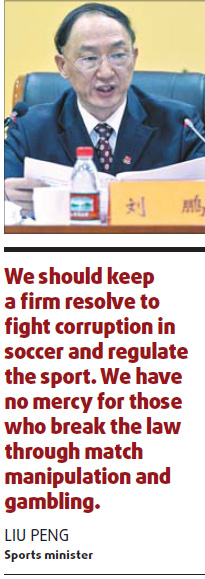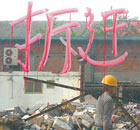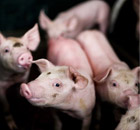Society
Corruption in soccer targeted
By Tang Yue (China Daily)
Updated: 2010-01-27 07:21
 |
Large Medium Small |
Minister vows crackdown on match-fixing, gambling acts
Sports Minister Liu Peng yesterday vowed to crack down on gambling and match-fixing in soccer nationwide in the latest move against corruption.
His vow marked the strongest signal sent by the authorities since a crackdown that began last August.
"We should keep a firm resolve to fight corruption in soccer and regulate the sport. We have no mercy for those who break the law through match manipulation and gambling," Liu said while delivering an annual work report at a national meeting.
Nan is reportedly involved in a number of cases closely linked to the Chinese Football Association (CFA).
With China topping the Olympic gold medals table for the first time at the 2008 Beijing Games, domestic leagues have been growing more professional and the sports market is getting more profitable. Liu's remarks sent a warning on emerging corruption in the field.
"China's sports developed well in the past few years and we are better off now. As the industry grows, there are increasing title sponsorships and advertising revenue so it is becoming a high-risk area for corruption," said Liu, who took charge of the State General Administration of Sport (SGAS) in 2004.
Nan, 47, who was detained by police on Jan 15 and subsequently dismissed from his position as executive vice-president of CFA last Thursday, is suspected of being involved in a long-time financial row with British company Iphox, the former title sponsor of the Chinese football league, according to the Oriental Morning Post (OMP).

Nan was in charge of contract signing but did not take action after the company failed to pay more than 50 million yuan ($7.3 million) during the stipulated time.
Nan is also suspected of taking bribes from the club in the domestic league.
"Nan was arrested because he received 500,000 yuan from a domestic team from northern China, which won the league title," a man, who declined to be named, was quoted as saying by Qilu TV.
The OMP also reported a price list for purchasing a place in the national squad. Players who wanted to be included in the national training camp should reportedly pay 100,000 yuan, while the price for a position in a major tournament will be doubled as all players hope for increasing payback in the club as a national team member.
Lang Xiaonong, a former official with the CFA, attributed the problems to the lack of democratic decision-making.
"A small number of top officials made all the decisions on Chinese soccer and determined the destiny of the sport. There was not enough discussion nor democratic decision-making, let alone democratic supervision," Lang said.
To deal with these problems, Liu said the SGAS will work together with at least six departments to supervise the scandal-plagued domestic soccer league, including the Ministry of Public Security, the Ministry of Justice and the People's Bank of China.
He also emphasized the need to develop the sport at the grassroots level and build up reserves for the national team, as well as the need to regulate the development of marketing for professional soccer.












